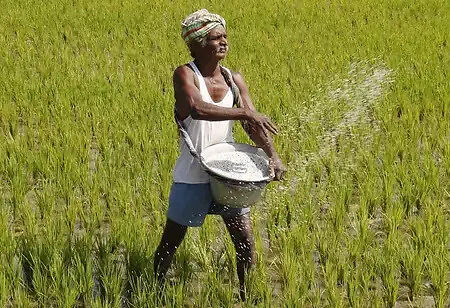
Food for Thought Exchanged During the G20 Agriculture Ministers' Meet in India


India's population is expected to grow along with food production and affordability thanks to price support, procurement, and the distribution of extra and subsidized grains. This is due to the fact that inflation is anticipated to decline and supply chain problems will be resolved. Further reducing food insecurity in India is the result of this. Therefore, in the latest G20 Agriculture Ministers’ Meeting, an ‘Outcome Document and Chair's Summary’ was adopted, reaffirming the meeting's commitment to ensuring food security and nutrition for everyone while also urging action.
Prime Minister Narendra Modi asked the G20 Agriculture Ministers Meeting to consider how to take joint action for achieving global food security after noting that the agricultural sector is currently dealing with a number of problems worldwide. Modi discussed the problems affecting the agricultural sector and claimed that the impact of geopolitical tensions has made the pandemic-related supply chain disruptions worse. Extreme weather events are becoming more frequent as a result of climate change, but the Global South is the region that is most affected, he said. Additionally, the PM highlighted the fact that 2023 has been designated as the International Year of Millets. He stressed the potential of millets to give farmers sustainable livelihoods while fostering climate resilience, as well as their nutritional advantages. India reaffirmed its dedication to exchanging best practices, knowledge, and innovations concerning cereals and ancient grains.
Focused on Four Areas of Discussion
PM Modi outlined four main areas for discussion at the meeting. First, to promote food security and nutrition, the promotion of agricultural diversification and advancements in social security systems are needed. The adoption of a climate-smart strategy for sustainable agriculture production based on agricultural system models, as well as the funding of climate-friendly technologies. To create inclusive agriculture value chains and robust food systems, thirdly, infrastructure for small and marginal farmers, women, and youth must be strengthened. Finally, the use of digital technology to transform agriculture with a focus on standardizing platforms for agricultural data as digital public goods.
Teamwork Required for Food Security and Nutrition
The G20 Ministers of Agriculture highlighted in the document the urgent need for teamwork to advance food security and nutrition that was emphasized in the G20 Matera and Bali Leaders' Declarations.
The ministers stressed about the high prices, continuous disruptions in global supply chains, and excessive price volatility of food and fertilisers in their Call for Action on Food Security and Nutrition.
For stabilizing the availability and affordability of food for everyone, particularly for those in vulnerable situations, they stressed that supply networks must be resilient, unbroken, and dependable.
The ministers indicated in the document that they support measures to foster innovations in crop development, production, and consumption patterns while emphasizing the necessity of a variety of safe, nutritious foods produced sustainably to boost food security and nutrition.
The ministers acknowledged the importance of international commerce, food security initiatives, sustainable agriculture and food production, and other factors for implementing the 2030 Agenda and achieving the Sustainable Development Goals (SDGs) of the UN.
Exchange of Helpful Tips and Lessons from the Past
The ministers agreed to work together to promote more effective traditional and local agricultural knowledge distribution as well as climate-resilient technology, nature-based solutions, and ecosystem-based methods.
To simultaneously balance and optimize the health of people, animals, plants, and ecosystems, and combat anti-microbial resistance (AMR), they called for an integrated and multi-sectoral ‘One Health approach. This would reduce the risks from emerging and existing zoonotic diseases with pandemic potential, as well as other threats to the security of global public health.
The ministers emphasized the great potential for inclusive welfare and sustainable development that policies supporting resilient and sustainable agriculture, food systems, and supply chains have.
They pledged to work with all stakeholders and intensify capacity-building initiatives, including the distribution of digital tools and technology and supporting its adoption by farmers, to make digital solutions in agriculture universally accessible and affordable.
Key Takeaways
Concerning the Russia-Ukraine conflict, the group stated that the G20 is not the appropriate platform for resolving security matters, despite the fact that security issues can have substantial ramifications for the global economy.
The group acknowledged the need for immediate action to address the debt risks in low- and middle-income nations. The members praised the end of the debt treatment for Chad and demanded that the work on the debt treatments for Zambia and Ethiopia be finished quickly. It anticipates both a prompt resolution of Sri Lanka's debt crisis and the prompt creation of the formal creditor committee for Ghana to work on the desired debt treatment. The committee charged the International Financial Architecture Working committee with creating a fair and thorough G20 Note on the Global Debt Landscape.
The group stated that it will work in accordance with the G20 Sustainable Finance Roadmap to enable greater financing for Sustainable Development Goals (SDG), including and beyond climate. Collectively, the members requested that the Sustainable Finance Working Group create an analytical framework for enabling finance for the SDGs, initially focusing on data and reporting connected to nature and social impact investing while taking into account national conditions.
The group suggested that the Common Reporting Standard (CRS) modifications and the Crypto-Asset Reporting Framework implementation packages be finished by the Organisation for Economic Co-operation and Development (OECD). The G20 anticipates that by their third summit in 2023, the FSB will have made high-level proposals for the supervision and regulation of stablecoins and crypto assets.
In addition, Union Agriculture Minister Narendra Singh Tomar met with counterparts from Oman, Vietnam, and Canada. The delegates also watched programs that are a fusion of India's dynamic various customs, arts, culture, and legacy in the city of pearls.